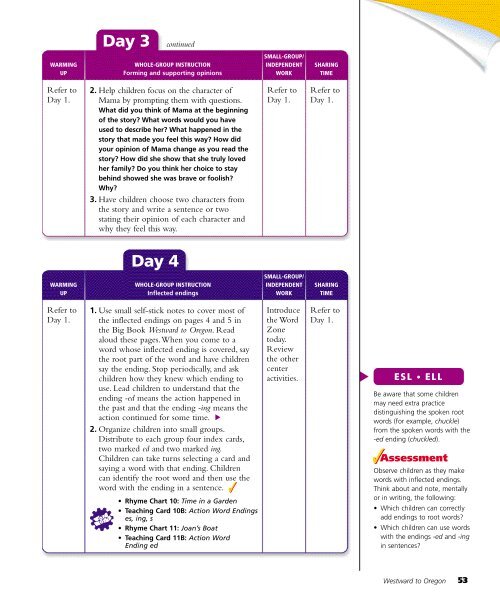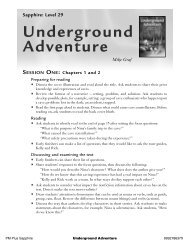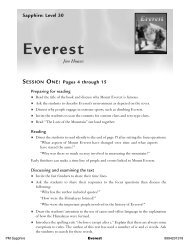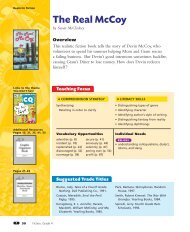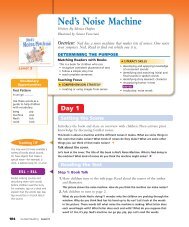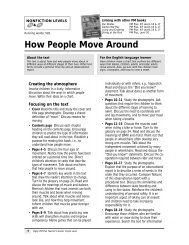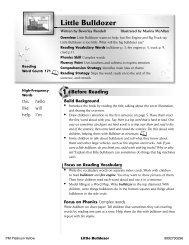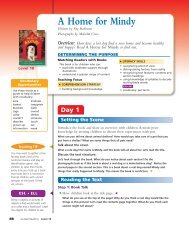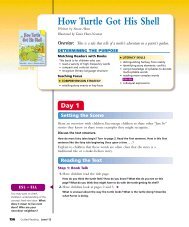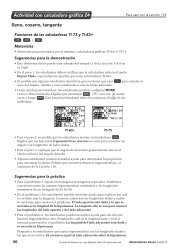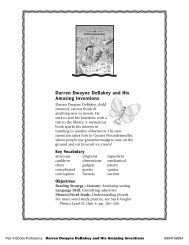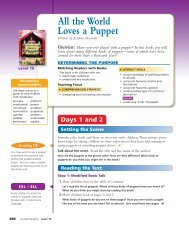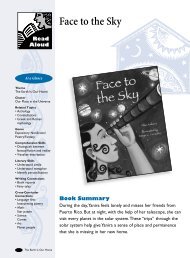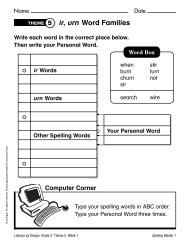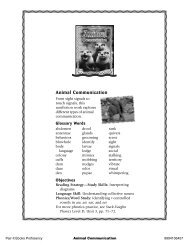Westward to Oregon - Rigby
Westward to Oregon - Rigby
Westward to Oregon - Rigby
Create successful ePaper yourself
Turn your PDF publications into a flip-book with our unique Google optimized e-Paper software.
WARMING<br />
UP<br />
Refer <strong>to</strong><br />
Day 1.<br />
WARMING<br />
UP<br />
Refer <strong>to</strong><br />
Day 1.<br />
Day 3<br />
continued<br />
WHOLE-GROUP INSTRUCTION<br />
Forming and supporting opinions<br />
2. Help children focus on the character of<br />
Mama by prompting them with questions.<br />
What did you think of Mama at the beginning<br />
of the s<strong>to</strong>ry? What words would you have<br />
used <strong>to</strong> describe her? What happened in the<br />
s<strong>to</strong>ry that made you feel this way? How did<br />
your opinion of Mama change as you read the<br />
s<strong>to</strong>ry? How did she show that she truly loved<br />
her family? Do you think her choice <strong>to</strong> stay<br />
behind showed she was brave or foolish?<br />
Why?<br />
3. Have children choose two characters from<br />
the s<strong>to</strong>ry and write a sentence or two<br />
stating their opinion of each character and<br />
why they feel this way.<br />
Day 4<br />
WHOLE-GROUP INSTRUCTION<br />
Inflected endings<br />
1. Use small self-stick notes <strong>to</strong> cover most of<br />
the inflected endings on pages 4 and 5 in<br />
the Big Book <strong>Westward</strong> <strong>to</strong> <strong>Oregon</strong>. Read<br />
aloud these pages.When you come <strong>to</strong> a<br />
word whose inflected ending is covered,say<br />
the root part of the word and have children<br />
say the ending. S<strong>to</strong>p periodically,and ask<br />
children how they knew which ending <strong>to</strong><br />
use. Lead children <strong>to</strong> understand that the<br />
ending -ed means the action happened in<br />
the past and that the ending -ing means the<br />
action continued for some time.<br />
2. Organize children in<strong>to</strong> small groups.<br />
Distribute <strong>to</strong> each group four index cards,<br />
two marked ed and two marked ing.<br />
Children can take turns selecting a card and<br />
saying a word with that ending. Children<br />
can identify the root word and then use the<br />
word with the ending in a sentence.<br />
✓<br />
• Rhyme Chart 10: Time in a Garden<br />
• Teaching Card 10B: Action Word Endings<br />
es, ing, s<br />
• Rhyme Chart 11: Joan’s Boat<br />
• Teaching Card 11B: Action Word<br />
Ending ed<br />
SMALL-GROUP/<br />
INDEPENDENT<br />
WORK<br />
Refer <strong>to</strong><br />
Day 1.<br />
SMALL-GROUP/<br />
INDEPENDENT<br />
WORK<br />
Introduce<br />
the Word<br />
Zone<br />
<strong>to</strong>day.<br />
Review<br />
the other<br />
center<br />
activities.<br />
SHARING<br />
TIME<br />
Refer <strong>to</strong><br />
Day 1.<br />
SHARING<br />
TIME<br />
Refer <strong>to</strong><br />
Day 1.<br />
✓<br />
ESL • ELL<br />
Be aware that some children<br />
may need extra practice<br />
distinguishing the spoken root<br />
words (for example, chuckle)<br />
from the spoken words with the<br />
-ed ending (chuckled).<br />
✓Assessment<br />
Observe children as they make<br />
words with inflected endings.<br />
Think about and note, mentally<br />
or in writing, the following:<br />
• Which children can correctly<br />
add endings <strong>to</strong> root words?<br />
• Which children can use words<br />
with the endings -ed and -ing<br />
in sentences?<br />
<strong>Westward</strong> <strong>to</strong> <strong>Oregon</strong> 53


